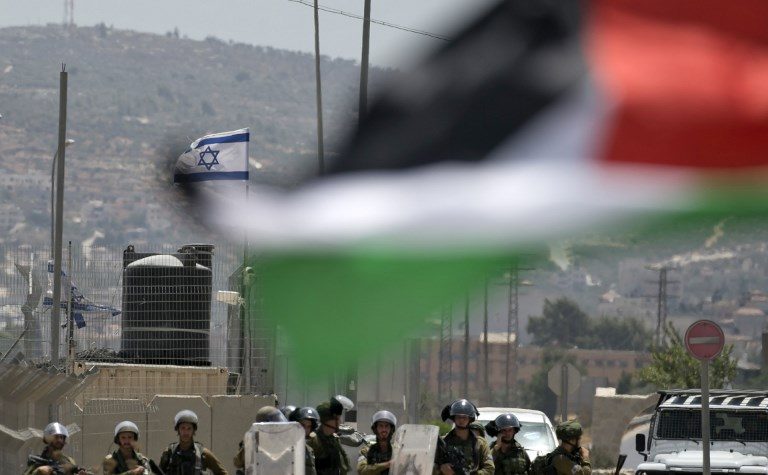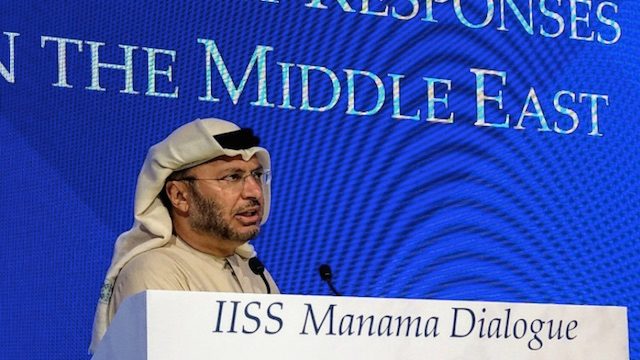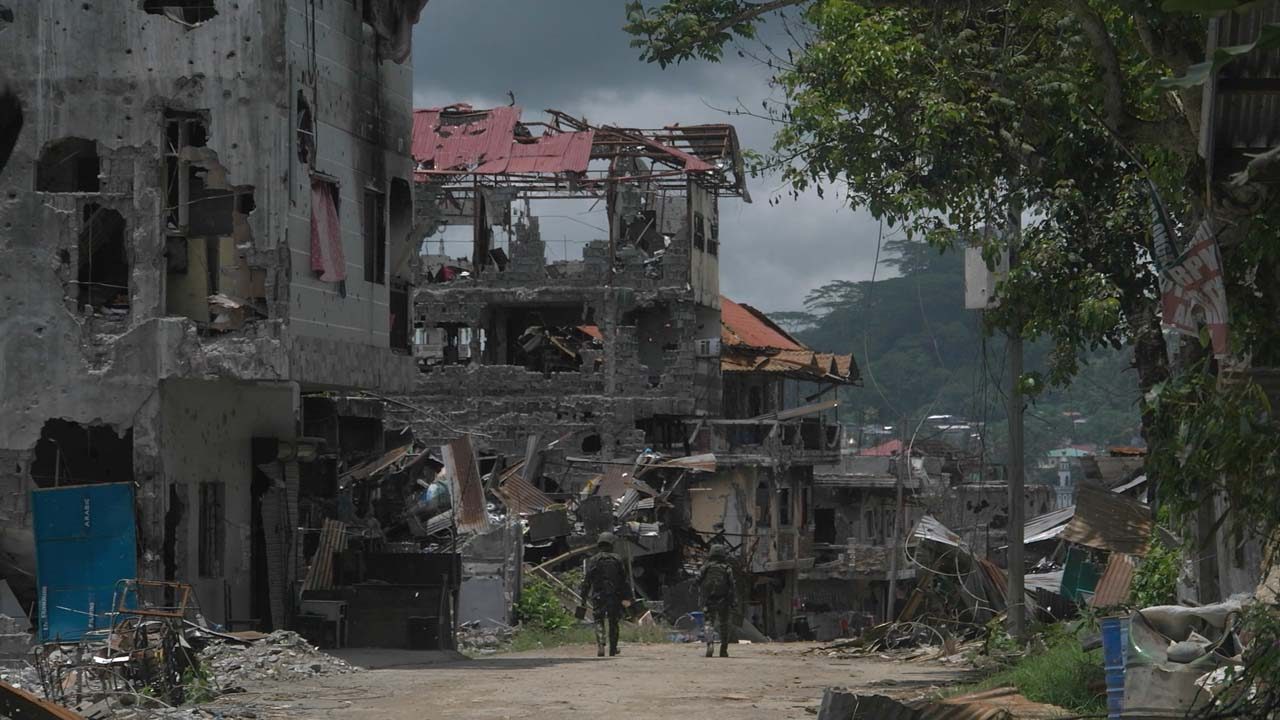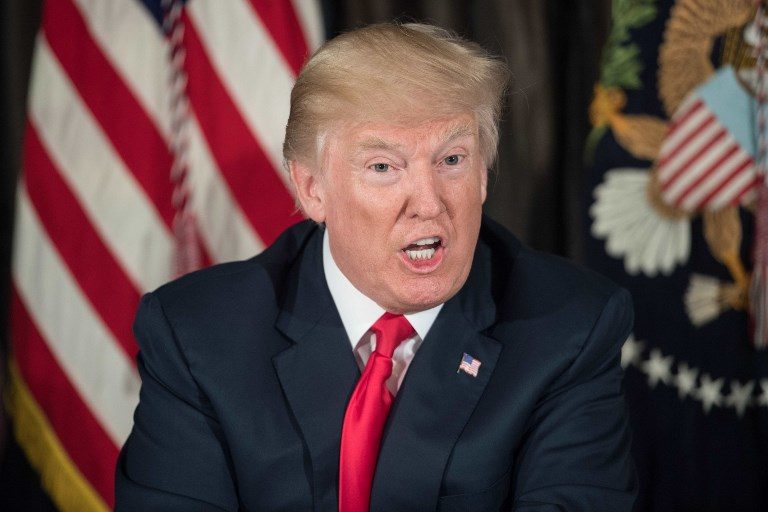SUMMARY
This is AI generated summarization, which may have errors. For context, always refer to the full article.

MANAMA, Bahrain – At the Al Noor Ballroom at the Ritz-Carlton, Dr Anwar Mohammad Gargash, the United Arab Emirates’ Foreign Affairs Minister, addressed a room of some of the Middle East’s top defense and security experts.
Among the crowd were other government officials and ministers, ambassadors, military personnel in uniform, and analysts from across the region.
A frank Gargash had been talking about the challenges and importance of seeking stability after Irag and Syria and the dangers posed by Iran. And then, like all those who spoke before him, he slammed US President Donald Trump’s recognition of Jerusalem as Israel’s capital.
“It is these issues that are actually a gift to radicalism,” he said of Trump’s move.
The condemnation of Trump’s statement from just 3 days earlier, was a widespread consensus at the Manama Dialogue, the region’s top security and defense summit.
At the event, Saudi Prince Turki Al Faisal Al Saud called Trump’s December 6 decision “a dangerous step.” Bahrain’s Minister of Foreign Affairs Khalid bin Ahmed Al Khalifa said it was a threat to a “peace process on which millions have pinned their hope and aspirations.” His Iraqi counterpart Dr Ibrahim Al Jaafari went so far as to call it a “step towards war.”
Trump’s move has obvious and immediate consequences for the Gulf. Thousands have marched in protests across the Arab world. Clashes erupted between Palestine and Israel, leading to the death of two Palestinians in Gaza, shot by the Israeli army. Aside from evangelical Christians and right-wing Jewish Americans, only Isreali Prime Minister Benjamin Netanyahu has praised the Jerusalem recognition.
Several peace plans have unravelled in the past decades over the issue of how to divide Jerusalem, which is home to holy sites sacred to Christianity, Judaism and Islam.
Israel seized Arab east Jerusalem in the 1967 war and later claimed all of Jerusalem as its capital in a move never recognized by the international community. The Palestinians want the eastern sector as the capital of their future state.
The international community has remained neutral, insisting the issue can only be resolved in negotiations through peace talks.
But the consequences of Trump’s move reach far beyond just the Gulf.
Over 7,000 kilometers away, in Indonesia, which has the world’s largest Muslim population, hundreds protested in front of the United States embassy condemning the decision. In Malaysia, Bangladesh and Pakistan, thousands also called for Trump to retract his statement.
The protests however, could well be the least of the world’s concerns.
Trump’s decision, along with recent development in the Middle East – specifically the liberation of Mosul and Raqqa from the Islamic State of Iraq and Syria (ISIS) terrorists – bring bad news, particularly to Southeast Asia.
Fanning flames
In Christian-majority Philippines, Trump’s statement was met with no fanfare.
This, as an Israeli media report said that the Philippines was one of the countries considering following America’s lead to move its embassy from Tel Aviv to Jerusalem.
There has been no evidence of this or confirmation from Philippine government officials. The Philippine government has not even released a statement on Trump’s declaration – despite the fact that the statement can very well affect the Philippines.
At the Manama Dialogue, there was not a single Philippine government official or representative present – compared to 3 registered participants each from Indonesia and Malaysia and one from Singapore – signaling a lack of appreciation by the Philippine administration of how Middle East security affects the country.
Why does Trump’s declaration matter?
Trump’s move heightens the risk of terror threats further, as experts warn it could be used by extremists to justify further attacks.
“Radicals and extremists will use that to fan the language of hate. To use it not because they’re interested in Jerusalem or in an overall two-state solution, but because they are interested in utilizing it in the current polarization we are seeing in the current state,” said Gargash.

Indonesian Islamic activist Yenny Wahid said the “reckless” decision will be used by radical groups as a recruiting tool, while Prince Turki said it would be “oxygen to lost souls.”
This is especially significant to the Philippines, which is just recovering from a 5-month war between government troops and ISIS-linked rebels. The conflict saw foreign fighters from Indonesia and Malaysia come to Marawi City, in the Southern Philippines. For the first time, ISIS-linked fighters held a city for months.
For the region, it was a rude awakening to the growing influence and power of ISIS, also known as the Islamic State, IS, ISIL, or its Arabic acroym Daesch, and to Southeast Asia’s inadequacies in countering terrorism. It is now trying to play catch up, with the region vowing to work together, to exchange intelligence, and strengthen its cooperation to fight extremism.
Trump’s statement is further problematic for Southeast Asia, after ISIS’ loss of territory in Iraq and Syria. ISIS has been eyeing the Philippines as a possible caliphate, even encouraging their followers in Southeast Asia to train and fight in the country.
So while leaders at the conference in Bahrain congratulated Iraq after it gained full control of its border with Syria and declared its war with ISIS over, Southeast Asia should be increasingly more concerned and vigilant.
With the fall of ISIS in the Middle East, comes more threats for the region still recovering from the reality of Marawi.
Not over
While the conference participants acknowledged ISIS’ loss of territory however, they were united in clarifying that it didn’t mean the war against ISIS is over.
“Countries in the region and elsewhere realize the threat from Islamic state and other Jihadi groups remains highly potent… We should also remember the Islamic State and al-Qaeda are not only active in Iraq and the Levant,” Dr Nelly Lahoud, Senior Fellow for Political Islamism for IISS-Middle East, said.
“We may therefore expect the rivalry between al-Qaeda and the Islamic State to be on a more equal footing now, with groups in different geographical regions competing with each other through escalating their attacks.”
In Southeast Asia, followers of al-Qaeda and ISIS are still present and active, with groups like Jemaah Islamiyah and the Abu Sayyaf splintering between both, and extremist fringes Maute group and BIFF recovering after the Marawi siege.
Gavin Williamson, the United Kingdom’s Secretary of State for Defense, also emphasized that the greater battle is against extremism and its ideologies, since “Daesh don’t have to hold territory in order to wage war.”
“Without a secure Gulf, the world is a less safe place,” he said.

In Southeast Asia, it is not just radical ideologies that have already been passed on, but also war tactics. In Marawi, urban warfare, sniping skills, and complex ratholes and trenches were evidence of a transfer of knowledge and advanced planning and coordination.
Even now, after the Philippine government declared victory over terrorists, analysts believe the Marawi conflict has changed the face of terrorism in the region and will have long-term repercussions for extremism in Southeast Asia.
The success of pro-ISIS fighters in occupying an entire Philippine city for an extended amount of time has inspired violence in other places in the region and could lead to a higher risk of violent attacks in other Philippine cities and in Indonesia and Malaysia; greater cooperation among Southeast Asian extremists; and new leadership for Indonesian and Malaysian pro-ISIS cells from among returning fighters from Marawi.
Southeast Asian ISIS supporters in Turkey, Syria, and Iraq, may also see the Philippines as an attractive alternative as ISIS is pushed back in the Middle East.
For Southeast Asia, it may be the perfect storm.
Global fight
Back in Manama, Gargash ended his segment on the Trump decision with a musing.
“I’m really surprised the Americans have this wonderful platform here to explain the Jerusalem decision and they are not here. It really needs a lot of convincing, [their view that] yes it’s drastic but it’s not changing anything,” he said, calling their absence a lost opportunity.
Similar to Southeast Asia, Washington appears to have no clear strategy on the Middle East. It has yet to appoint U.S. ambassadors to Saudi Arabia, Turkey, Egypt, Qatar and Jordan. In Southeast Asia, the lack of Trump’s foreign policy – compared to former president Barack Obama’s aggressive pivot to Asia – was evident at the recently concluded Association of Southeast Asian Nations Summit in Manila.
The United States’ inaction is perilous.
“US leadership is imperative. If the US does not lead, another country will,” said Retired General and former Central Intelligence Agency Director David Petraeus.

He also highlighted that the “approach has to be comprehensive” rather than a “narrow counter terrorist” one, since the war against terror is a “generational struggle.”
Ayman Safadi, Jordan’s Minister of Foreign Affairs, emphasized, “We will never prevail in our long term war against terrorism unless we defeat the root causes. Loss of hope, poverty… these are from where dark ideologies of hate thrive.”
“We’ve all done a great job in ending ISIS and its territorial control. Our biggest battle is to defeat their narrative, and addressing root causes of conflict.”
Williamson said it was crucial to take terrorists on in the virtual and real world, infiltrate communication channels, educate the youth, and work with partners globally both militarily and politically.
“We cannot give up the battle for hearts and minds,” he said. “We need to win the battle of ideas, eradicating the virus of extremism.”
The strategies are crucial for anywhere in the world, whether in the Middle East or Southeast Asia – with intense pressure to step up if the United States will not take the lead. But these are not novel ideas.
In Southeast Asia, the same solutions are consistently discussed, but implementation and fostering trust among nations remain obstacles.
What is different though, is it is even more critical now more than ever to act.
“I’m worried we will see the Jerusalem decision as a turning point… like a watershed moment,” said Gargash. “I hope not but this is a worry for me.” – Rappler.com
Natashya Gutierrez travelled to Manama, Bahrain with support from the International Institute for Strategic Studies (IISS).
Add a comment
How does this make you feel?
There are no comments yet. Add your comment to start the conversation.